When it comes to your poodle's health, staying informed about neurological disorders is a key component of responsible pet ownership. From understanding the subtle signs to implementing effective management strategies, being proactive can make a significant difference in your furry friend's well-being. By exploring the common issues, recognizing symptoms, and discovering causes, you can equip yourself with the knowledge needed to navigate potential challenges with confidence. So, are you ready to take a closer look at how to safeguard your poodle's neurological health?
Key Takeaways
- Watch for seizures, tremors, and behavioral changes for early detection.
- Seek veterinary consultation for changes in coordination and muscle movements.
- Tailored interventions like physical therapy and behavioral modification are beneficial.
- Regular veterinary check-ups and balanced diet are essential for neurological health maintenance.
Common Neurological Disorders in Poodles
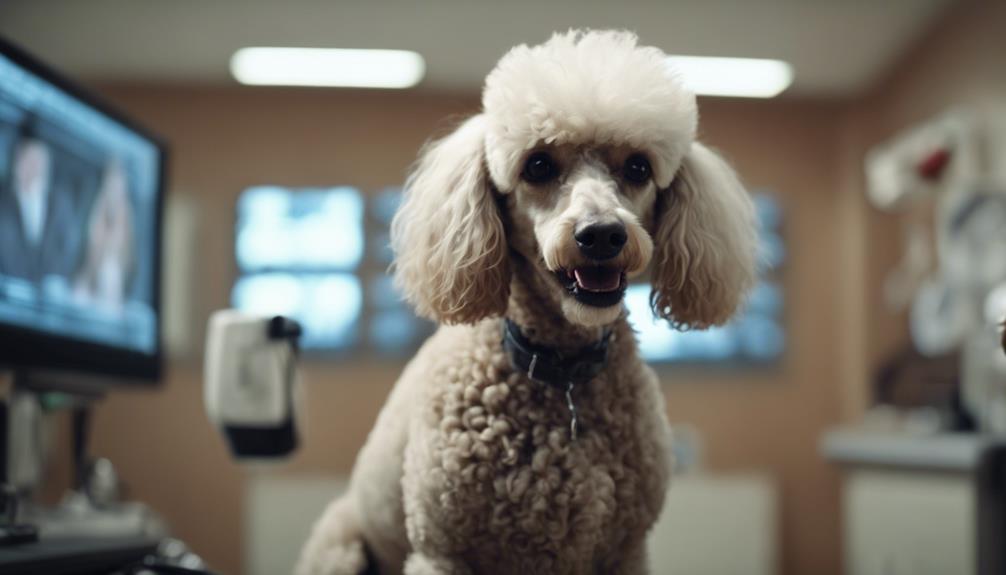
Poodles commonly experience a variety of neurological disorders that can impact their overall health and well-being. Idiopathic Epilepsy, a condition prevalent in Poodles, can result in recurring seizures that may require management with medication. Vestibular Disease is another issue that affects Poodles, leading to symptoms such as dizziness, imbalance, and difficulty coordinating movements. Degenerative Myelopathy poses a concern for Poodles, causing weakness in the hind end that can progress to paralysis over time.
Moreover, Poodles are susceptible to Intervertebral Disc Disease (IVDD), a condition that can cause back pain, nerve damage, and coordination problems. Additionally, Cognitive Dysfunction Syndrome (CDS) may affect aging Poodles, resulting in disorientation, confusion, and changes in behavior. Being aware of these common neurological disorders in Poodles is crucial for early detection and appropriate intervention to ensure the well-being of these beloved companions.
Recognizing Symptoms of Neurological Issues

Watch closely for common signs of neurological disorders in your Poodle, such as seizures, tremors, or unexplained behavioral changes. Note any facial paralysis, balance issues, or difficulty walking, as these could indicate underlying neurological problems. If you observe changes in coordination, vision, or muscle movements, it's crucial to seek veterinary consultation promptly for proper evaluation and management.
Common Signs of Disorders
When observing your Poodle for potential neurological issues, pay close attention to subtle changes in behavior and physical symptoms that may indicate underlying disorders. Signs of neurological disorders in Poodles include seizures, muscle weakness, head tilting, loss of balance, difficulty walking, facial paralysis, abnormal eye movements, sudden behavioral changes, tremors, disorientation, and loss of coordination. These symptoms can help in the early detection and management of neurological disorders in your Poodle. Additionally, be mindful of any unusual twitching, sensitivity to touch, or unexplained pain in your Poodle, as these could also be indicators of neurological issues that require veterinary attention. Understanding these common signs can assist you in recognizing potential problems and seeking appropriate care for your beloved pet.
Behavioral Changes to Note
Detecting neurological issues in your Poodle involves attentively noting any sudden changes in behavior, such as confusion, anxiety, or aggression. To recognize symptoms of neurological disorders, pay close attention to the following:
- Unexplained Changes in Activity Levels: Look for increased restlessness or decreased interest in play.
- Signs of Disorientation: Watch for getting lost in familiar places or staring into space.
- Altered Interactions: Note changes in how your Poodle interacts with family members or other pets, like becoming clingy or avoidant.
- Sleep Pattern Disturbances: Monitor for restlessness at night or excessive daytime napping, as these could be indicators of underlying neurological issues.
Being vigilant about these behavioral changes can provide valuable insights into your Poodle's neurological health.
Seeking Veterinary Consultation
Noticing any unusual signs like seizures, tremors, or facial paralysis in your Poodle can alert you to the presence of potential neurological issues, prompting the need for veterinary consultation. Changes in behavior, coordination, or movement patterns are also red flags that may indicate underlying neurological problems requiring expert evaluation. Immediate veterinary assessment is crucial upon observing any abnormal neurological symptoms in your Poodle for accurate diagnosis and timely intervention. Neurological disorders in Poodles may present as altered reflexes, weakness, or disorientation, necessitating specialized veterinary care. Early detection of neurological issues in your Poodle is key as it allows for prompt intervention, improving the prognosis and enhancing the quality of life for your furry companion.
Causes of Neurological Disorders in Poodles

Genetic predisposition plays a significant role in the development of neurological disorders in Poodles. These disorders can arise due to various factors, including environmental influences and exposure to toxins. Common causes of neurological issues in Poodles include:
- Brain Tumors: Poodles are susceptible to developing brain tumors, which can exert pressure on the brain and lead to neurological symptoms.
- Epilepsy: This neurological disorder can cause recurring seizures in Poodles, impacting their quality of life.
- Spinal Cord Diseases: Conditions affecting the spinal cord, such as intervertebral disc disease, can result in neurological dysfunction in Poodles.
- Age-Related Degenerative Changes: Senior Poodles may experience cognitive dysfunction due to age-related degenerative changes in the brain, leading to neurological issues.
These causes highlight the importance of regular veterinary check-ups and early detection to effectively manage neurological disorders in Poodles.
Diagnosing Neurological Problems in Poodles
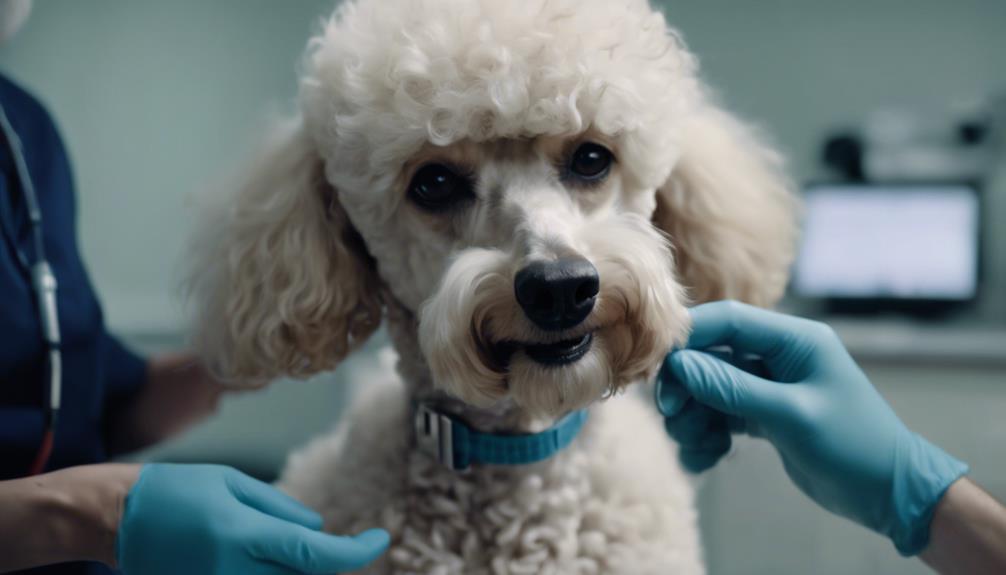
When diagnosing neurological problems in Poodles, thorough physical exams and specialized neurological assessments are essential for accurate evaluation. Poodles may exhibit subtle signs such as seizures, disorientation, or coordination issues, highlighting the importance of early detection. Veterinary expertise in neurology plays a critical role in diagnosing these disorders effectively. Advanced imaging techniques like MRIs may be necessary to get a comprehensive understanding of the neurological issues present. By conducting detailed neurological assessments, veterinarians can pinpoint the specific disorders affecting Poodles and develop tailored treatment plans. Prompt intervention following diagnosis is crucial as it can greatly impact the prognosis and enhance the quality of life for Poodles with neurological disorders. Therefore, seeking professional veterinary care and expertise is key to diagnosing and managing neurological problems in Poodles efficiently.
Managing Poodle Neurological Disorders
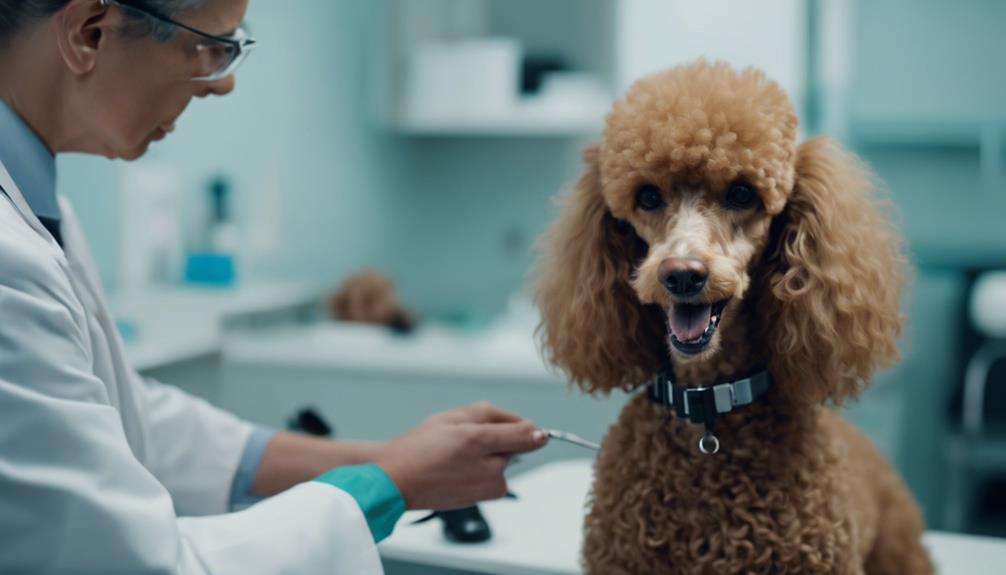
When managing Poodle neurological disorders, consider utilizing medications for seizures, exploring physical therapy options, and implementing behavioral modification techniques. These approaches can help improve your Poodle's quality of life and manage their neurological condition effectively. Consulting with a specialized veterinarian and staying informed about your Poodle's specific disorder are crucial steps in ensuring optimal care.
Medication for Seizures
Managing Poodle neurological disorders involving seizures typically requires the administration of anti-epileptic medications prescribed by veterinarians. When treating seizures in Poodles, the following key points should be considered:
- Medication Options:
- Phenobarbital
- Potassium bromide
- Levetiracetam
- Tailored Dosages: Dosages of anti-epileptic medications are customized based on the individual Poodle's seizure frequency and response to treatment.
- Regular Monitoring: Continuous monitoring of Poodles on seizure medications is crucial to evaluate effectiveness and make necessary dosage adjustments.
- Side Effects: Be aware of potential side effects such as sedation, increased thirst, and liver function abnormalities. Regular veterinary supervision is essential to manage these effects effectively.
Physical Therapy Options
To optimize the rehabilitation of Poodles with neurological disorders, tailored physical therapy interventions are crucial for improving their mobility, coordination, and muscle strength. Physical therapy offers specialized exercises and techniques to aid in the recovery of Poodles facing neurological issues such as spinal cord injuries or vestibular disease. Components like hydrotherapy, balance exercises, and controlled movements play a significant role in Poodle neurological rehabilitation. By engaging in physical therapy, Poodles can experience an enhanced quality of life and increased independence post neurological challenges. Consistent and structured physical therapy sessions are vital for the long-term management of Poodle neurological disorders, ensuring that they can maintain their mobility, coordination, and overall well-being.
Behavioral Modification Techniques
Implementing structured behavioral modification techniques is essential for effectively managing Poodle neurological disorders, emphasizing positive reinforcement and consistency in training methods. To help your Poodle cope with neurological challenges, consider the following strategies:
- Positive Reinforcement: Reward good behavior promptly to encourage desired actions.
- Training Consistency: Establish clear rules and stick to them to provide a sense of security.
- Mental Stimulation: Engage your Poodle with puzzle toys and interactive games to keep their mind active.
- Anxiety Reduction: Create a calm and predictable environment at home to help alleviate stress and anxiety for your Poodle.
Medication for Poodle Neurological Health

Utilizing appropriate medications is crucial in effectively addressing neurological health disorders in Poodles. When it comes to Poodle neurological health, medication plays a significant role in managing various conditions. Anticonvulsants such as phenobarbital or potassium bromide are commonly prescribed to help control seizures in Poodles with neurological disorders. Corticosteroids may be recommended to reduce inflammation and swelling in the brain or spinal cord, providing relief for certain conditions. Additionally, neuroprotective medications like gabapentin or memantine can aid in preserving nerve function and slowing down disease progression in Poodles facing neurological issues. For Poodles experiencing cognitive dysfunction syndrome (CDS), cholinesterase inhibitors like selegiline might be suggested to enhance cognitive function and overall quality of life. Remember to adhere closely to your veterinarian's dosage instructions and carefully monitor your Poodle for any potential side effects while administering these crucial neurological medications.
Supplements and Dietary Management

You can optimize your Poodle's neurological health by incorporating essential supplements like omega-3 fatty acids and vitamin E into their diet. Tailoring a diet plan rich in antioxidants, essential nutrients, and anti-inflammatory ingredients like turmeric can help manage cognitive dysfunction and reduce neurological inflammation in your furry companion. Ensuring a balanced diet with adequate levels of vitamins C and E, along with beta-carotene, is crucial for promoting overall neurological well-being in Poodles.
Essential Supplements for Poodles
When considering essential supplements for Poodles, incorporating Omega-3 fatty acids can significantly support brain health and cognitive function. To further enhance your Poodle's well-being, consider the following essential supplements:
- Glucosamine and chondroitin supplements aid in joint health, crucial for Poodles prone to orthopedic issues.
- Vitamin E boosts immune function and protects cells from damage in Poodles.
- Probiotics promote gut health and aid in nutrient absorption for overall well-being in Poodles.
- Coenzyme Q10 can help maintain heart health and energy production in aging Poodles.
These supplements play a vital role in supporting various aspects of your Poodle's health, ensuring they lead a happy and healthy life.
Tailored Diet Plans
Tailored diet plans for Poodles with neurological disorders prioritize the incorporation of specific supplements and nutrient-rich foods to support cognitive function and overall brain health. Including Omega-3 fatty acids in their diet can promote brain health, while antioxidants and vitamins help reduce oxidative stress and inflammation. A personalized diet plan tailored to your Poodle's specific neurological needs is crucial. By focusing on balanced protein and carbohydrate levels, you can help maintain stable energy levels. Consulting with a veterinarian or canine nutritionist is recommended to ensure the diet plan meets your Poodle's requirements. Remember, a well-thought-out diet plan plays a significant role in managing neurological conditions and supporting your Poodle's cognitive function.
Surgical Options for Poodle Neurological Disorders
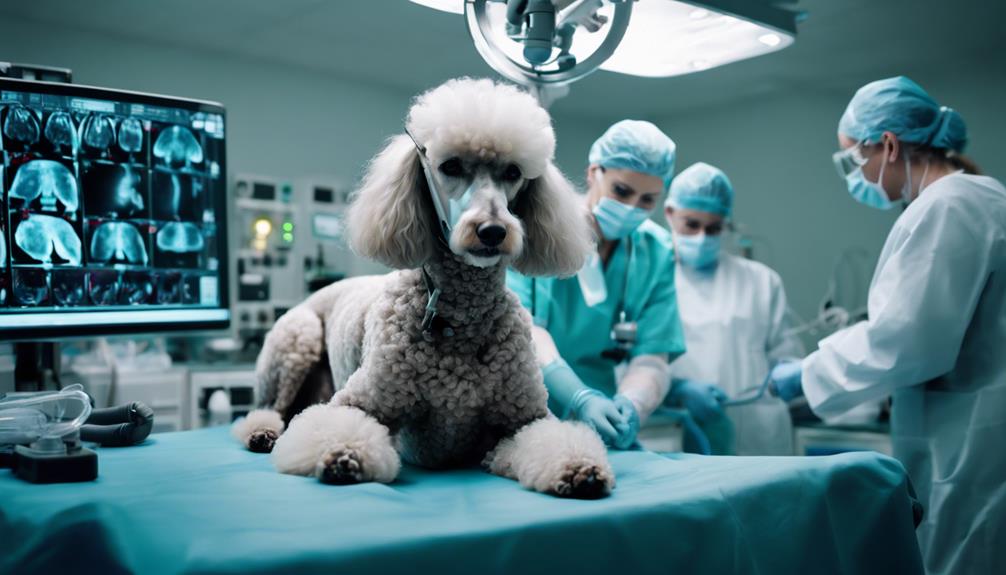
Surgical interventions for Poodle neurological disorders encompass procedures tailored to address conditions such as intervertebral disc disease (IVDD) and brain tumors. When considering surgical options for your Poodle's neurological health, it's important to understand the specialized expertise and advanced techniques involved in these procedures. Here are some key points to consider:
- Neurosurgical interventions target specific neurological issues like IVDD or brain tumors to alleviate pressure on the spinal cord and nervous system.
- Specialized expertise is crucial for accurate diagnosis and treatment planning, ensuring the best possible outcome for your Poodle.
- Post-operative care is essential for your Poodle's recovery, including rehabilitation and close monitoring of neurological function.
- Surgical management of Poodle neurological disorders can greatly enhance your dog's quality of life by addressing the root causes affecting their central or peripheral nervous system.
Recovery Strategies for Poodle Neurological Issues

To support your Poodle's recovery from neurological issues, implementing a structured rehabilitation program involving tailored physical therapy and exercises is crucial for their well-being. By customizing these activities to suit your Poodle's specific neurological disorder, you can help improve their mobility, strength, and coordination. Regular monitoring of your Poodle for any changes in symptoms or behavior is essential, allowing you to adapt the rehabilitation program as needed. Communication with your veterinarian is key to tracking progress and making necessary adjustments. Creating a safe and supportive environment for your Poodle during this recovery period is vital to prevent injuries and reduce stress.
In addition to physical therapy, consider incorporating complementary therapies like acupuncture or hydrotherapy to enhance your Poodle's recovery and overall quality of life. Adhering to medication schedules prescribed by your veterinarian, making dosage adjustments as required, and implementing any lifestyle modifications recommended will optimize your Poodle's recovery journey from neurological disorders. Remember, each step you take plays a crucial role in helping your beloved Poodle regain their health and happiness.
Preventing Poodle Neurological Disorders
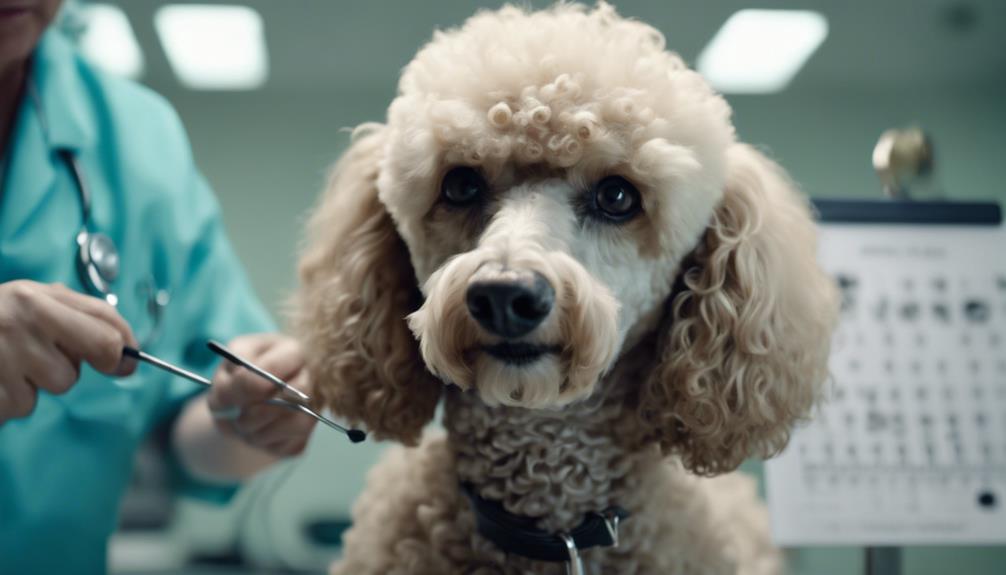
Regular neurological screenings and check-ups are essential for early detection and prevention of neurological disorders in Poodles. To prevent Poodle neurological disorders, consider the following:
- Balanced Diet: Provide a well-rounded diet rich in antioxidants and essential nutrients to support brain health and reduce the risk of neurological issues.
- Mental Stimulation: Engage your Poodle in mental stimulation activities like puzzle toys and training exercises to maintain cognitive function and prevent cognitive decline.
- Avoid Toxins: Keep your Poodle away from toxins and hazardous substances to safeguard them from neurological damage and related disorders.
- Supervision: Maintain a safe and stimulating environment with proper supervision to prevent accidents and injuries that may lead to neurological issues in Poodles.
Frequently Asked Questions
What Neurological Disorder Do Poodles Have?
Poodles may experience various neurological disorders such as seizures, canine epilepsy, cognitive dysfunction, vestibular disease, facial paralysis, and spinal issues. Early detection and proper management are crucial in addressing these conditions to ensure your Poodle's well-being.
How Do I Know if My Dog Has Neurological Problems?
To recognize if your dog has neurological problems, watch for symptoms like seizures, coordination issues, altered gait, or sudden behavior changes. Consult a vet for diagnosis and treatment options. Pay attention to behavioral changes and consider physical therapy or holistic approaches for management.
What Supplements Are Good for Dogs With Neurological Problems?
For dogs with neurological problems, consider incorporating natural remedies like Omega-3 fatty acids, vitamin B complex, antioxidants, CoQ10, and herbal supplements such as turmeric. These can provide essential nutritional support and promote a holistic approach to managing neurological disorders.
What Are the Three Stages of Dog Dementia?
In dog dementia, the stages progress from mild with subtle changes like disorientation and altered sleep patterns, to moderate with increased confusion and house-soiling, and finally severe with significant cognitive impairment and inability to perform tasks.
Conclusion
In conclusion, recognizing and managing neurological disorders in poodles is crucial for their well-being. By staying vigilant for symptoms like seizures or coordination problems, seeking prompt veterinary care, and following treatment plans diligently, you can help your furry companion live a healthier life. For example, a poodle named Bella was diagnosed with epilepsy, but with proper medication and lifestyle adjustments, she now enjoys a happy and active life free from seizures. Stay informed and proactive in caring for your poodle's neurological health.
